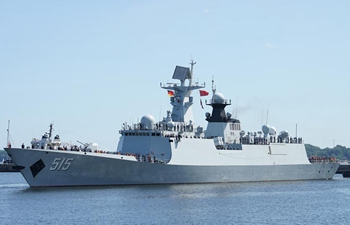BEIJING, June 19 (Xinhua) -- Global traders were thrown into further uncertainty on Tuesday after the United States threatened to slap an additional 10-percent tariff on 200 billion U.S. dollars worth of Chinese goods.
Washington's latest move drew a swift and firm response from China, which pledged to take comprehensive measures to retaliate and safeguard not only its own interests but also the free trade regime and common interests of all.
Analysts said the United States' unilateral and protectionist moves would hurt developing and developed countries alike. The nations affected should jointly fight back and prevent Washington from sliding further in the wrong direction.
CASUALTIES ON ALL SIDES
The new threat, issued by U.S. President Donald Trump in a White House statement, came soon after Washington announced plans to impose additional tariffs on Chinese goods worth around 50 billion dollars.
"Such practice of imposing extreme pressure and blackmailing is contrary to the consensus the two sides have reached through rounds of consultations, and disappoints the international community," a spokesperson of China's Ministry of Commerce said Tuesday.
"The trade war waged by the United States is against both the law of the market and the development trend of today's world. It undermines the interests of the Chinese and American people, the interests of companies and the interests of the people all over the world," the spokesperson said.
Umit Alperen, an analyst with Ankara Policy Center, a Turkish think tank, pointed out that developing countries need fewer trade barriers to sell goods and develop their economies.
"Almost all developing countries are troubled by Trump's protectionist policies," he said. "I am sure that all developing countries will fight for multilateral trade against Trump's protectionist policies."
Developed economies are also poised to suffer. Alessia Amighini, a senior associate research fellow at the Institute for International Political Studies in Italy, referred to the spillover effect on the European Union.
"There is a great economic interdependence between the European Union, China, and the U.S., and this will only make trade more expensive and slow economic growth for the countries involved," Amighini said.
"There are problems we can't even calculate yet. For example, you could have a European carmaker who makes some of their vehicles in China to sell in the U.S. market. How will that be impacted?" she said.
The United States is not expected to emerge unscathed either. U.S. business news channel CNBC cited a 2015 study by Oxford Economics, a global research firm, as saying that 2.6 million jobs in the United States across a range of industries are supported by the U.S.-China trade relationship.
U.S. equipment manufacturers and agricultural associations have voiced strong opposition to the Trump administration's decision to move forward with tariffs on Chinese goods, saying it will put over 1 million jobs in America at risk and inflict heavy losses on the U.S. side.
COUNTERMEASURES NEEDED
In the face of Washington's protectionist whims, "the affected countries should not sit quietly," V. Upadhyay, a professor of economics at the Delhi-based Indian Institute of Technology, said. "(They) should take countermeasures targeting the United States. In this case, China should retaliate and announce similar measures on ... U.S. goods."
"If the affected countries do not announce countermeasures, Trump's confidence in his protectionist policy will only drastically increase in the days to come," he stressed.
Daniel Haber, a former adviser to the French minister of foreign trade, called Trump's attitude "irrational and contrary to previous commitments and treaties."
"China must be determined and fight back firmly in response to the capriciousness of the United States," added Haber, who is now president of France Pacific Consultants, a consulting firm.
In its response to Washington's new threat, the Chinese Ministry of Commerce said that if the United States loses its rationality and unveils another list of Chinese products for additional tariffs, China will have no choice but to take comprehensive measures combining quantitative and qualitative ones.
China has repeatedly said it would hate to be engaged in a trade war with the United States, and wants to resolve bilateral trade issues through negotiations. However, it will fight back, if necessary, to safeguard the interests of its people.
"America has thrown the first punch in a trade war where there will be no winners," Tom Watkins, an adviser to the Michigan-China Innovation Center, a nonprofit organization seeking to build business ties between the U.S. state of Michigan and China, said last week.
"For the sake of the American and Chinese people, let's hope calmer heads prevail and we walk back these decisions and negotiate a mutually satisfactory settlement," he added.
(Xinhua reporters Xu Tian in Paris, Chen Zhanjie in Rome, Peter Mertz in Los Angeles, Miao Zhuang and Xu Jing in Chicago, Hu Xiaoming in New Delhi, and Zeynep Cermen in Istanbul contributed to this report.)















